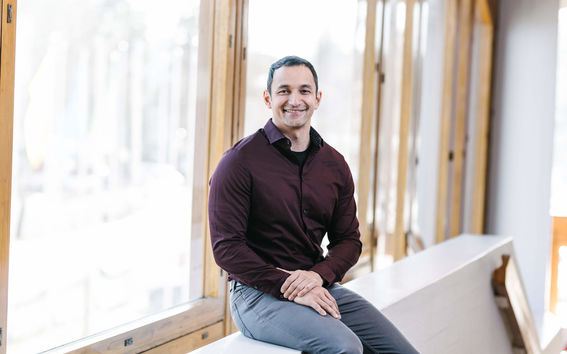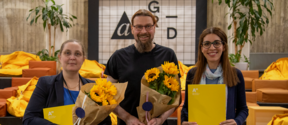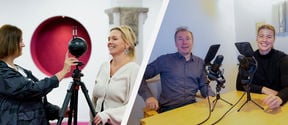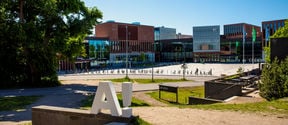Get to know us: Associate Professor Michael Hummel

Who are you and how did you end up doing what you do?
My name is Michael Hummel, originally from a small town in Austria, Innsbruck, where I studied chemistry. By training, I'm actually an inorganic chemist. I moved to Finland in 2009 as a postdoctoral researcher, with very little knowledge about wood and the many ways it can be used. My plan was to stay a year or two and then return to Austria. But I really enjoyed my work at Aalto University, and as the years passed, I got more and more fascinated by wood as a raw material. Not only in the laboratory but I also enjoyed the Finnish forests and the best way to use its wood: sauna!
I got absorbed in the field of wood science, cellulose processing and biopolymer chemistry. In the group of Professor Sixta, we developed a fiber spinning process, which is nowadays termed Ioncell®. This was the starting point of my own research, which then expanded to various biopolymers, also those derived from other sources than wood.
What got you interested in Biopolymer chemistry?
Biopolymers are produced by living organisms and represent a renewable feedstock for a wide spectrum of applications. Biopolymers have been used by humankind for millennia before the rise of synthetic polymers has overshadowed them. For decades we have now conveniently enjoyed the amenities of plastics and ignored the associated problems for too long. Meanwhile, the roof is on fire and we cannot keep exploiting finite resources for products that accumulate in the environment once they are discarded. Many scientists see a vast untapped potential in biopolymers to use them as alternative feedstock for currently fossil-based products. When I started to work at the Department of Bioproducts and Biosystems (former Department of Forest Products Technology) I had the opportunity to learn from excellent researchers in the field of (wood-based) biopolymers and I decided that I would like to pursue related research myself.
What is the main goal of your research group?
As we are becoming increasingly aware of all the problems that synthetic, oil-based and often non-degradable polymers cause, we need to shift back to the use of natural materials. In my research, I strive for a better understanding of the properties and structure of biopolymers from various sources in order to turn them into sustainable products. This requires the development and use of green chemistry and energy-saving technologies. We are trying to find a balance between vital fundamental research and application-oriented development. In other words, we try to understand distinct phenomena, while always having one or more applications in mind.
How will our society benefit from your research?
I think academic researchers in general have a twofold role; our research should enlarge knowledge and enhance our understanding of nature. We must discover and unveil the fundamentals in science to be able to provide solutions for our and the future generations. As mentioned, we need to develop new products that allow us to maintain our comfortable lifestyle in a much more sustainable way.
Our second role is to create awareness. We need to pinpoint, formulate and highlight the problems that we need to solve. We need to educate our students in critical thinking and to develop a challenging mindset. But we also must draw attention to the alternative solutions once they are available. It is not enough to just “complain” about things - we need to offer solutions.
What is your favorite part about your job?
To work with passionate and motivated people on many levels: idealistic students ready to change the world, passionate postdocs eager to enhance their knowledge, and knowledgeable professors able to see the big picture.
And the job’s diversity. Every day is totally different: one day you do lab research, the next day you teach in class, and on yet another day you may attend a seminar with academics and industrial representatives.
What is the weirdest or most memorable thing that you have been able to do while working at Aalto?
Working as a researcher at Aalto University has been an incredible journey with a lot of memorable moments. One was the breakthrough moment in the development of the Ioncell® process. We were working on it already for four years and had conducted hundreds of―sometimes very frustrating―mistrials until one day in March 2013, when we finally had the first successful trial. After that, the process developed quickly and led to another highlight – which is still ongoing: the close collaboration with our designers. They enrich our scientific thinking with a different way of looking at challenges.
This interview is conducted by Mikaela Kumlin who has been working during the summer at the School of Chemical Engineering.
- Published:
- Updated:
Read more news

Aalto Open Science Award ceremony brought together Aaltonians to discuss open science
Last week we gathered at A Grid to celebrate the awardees of the Aalto Open Science Award 2023 and discuss open science matters with the Aalto community.
Seed funding available to boost collaboration between Aalto, KU Leuven and University of Helsinki
Aalto University, KU Leuven and the University of Helsinki launch the 2nd exploratory seed funding call to explore research collaboration possibilities. The funding call is open until 10 September 2024.
Workshop day for teachers: 360° environments and podcasts
On Tuesday 4.6. a workshop day consisting of 360° environment creation and podcast production provides a way to get to know these media in practice. Feel free to join both workshops or one of them according to your time and interest.